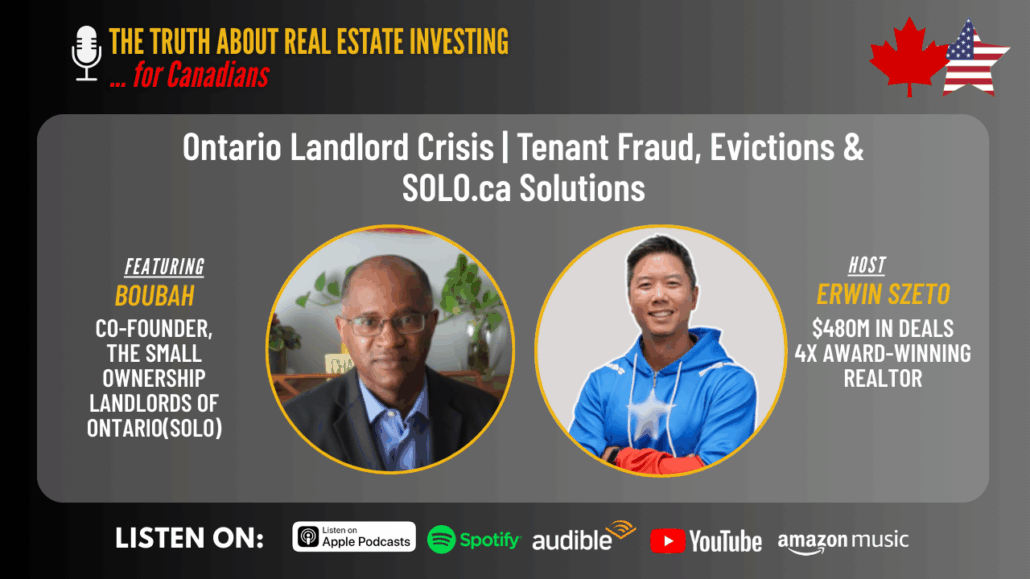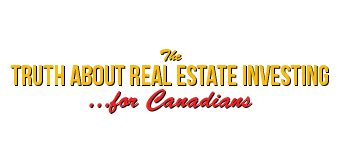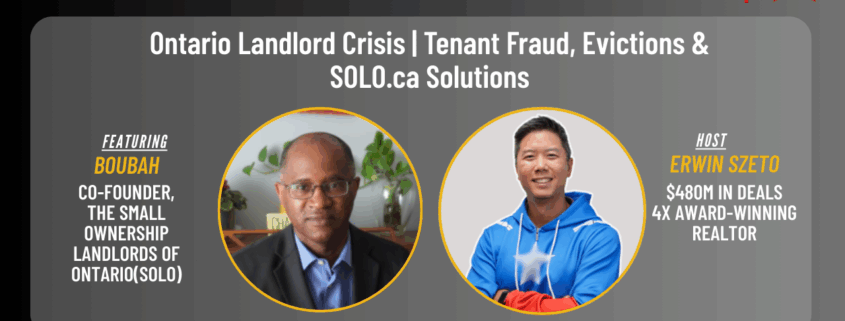The Shocking Truth About Landlords in Ontario: 10 Fast Facts Every Investor Should Know

Recorded: August 2025
Guest: Boubah, Co-Founder of the Small Ownership Landlords of Ontario (SOLO)
Host: Erwin Szeto, The Truth About Real Estate Investing for Canadians Podcast
I’ll never forget our first non-paying tenant back in 2007.
The property was over 100 years old—charming in its own way—and brand new to us as owners. It was only our third investment property, and looking back… we really didn’t know what we were doing.
We missed obvious red flags, like the tenant’s SIN number being wrong. The two roommates were new to town, desperate for a place to rent, and we were too nice. We signed a lease. We accepted a personal cheque for the first and last month’s rent. And yes, we even handed over the keys before the cheque cleared. You know where this is going.
It was 2007, so expenses weren’t as brutal as they are today, but the ordeal still cost us around $10,000—including legal fees. The worst part? My partners were family. We were all upset, confused, and completely unprepared.
None of us even knew what an N4 was (a notice for eviction due to non-payment of rent). But our tenant sure did. When my family member handed him the notice at his workplace—Boston Pizza—he yelled at us to never come back.
Meanwhile, this same tenant was busy making himself at home—he even installed a heavy bag (the kind boxers use), drilled right into the living room ceiling. All while never paying a single dollar in rent. That was our introduction to Ontario’s rental system.
What no one told us in the early days was just how stacked the system is against landlords. How could I not change the locks on my own property when the tenant hadn’t even paid first and last month’s rent? Because if I did, the tenants could simply call the police—and in my experience, the police would side with them. The tenant. WTF?!
Fast Forward to Today…
It’s been nearly 20 years since that first painful lesson. Since then, I’ve coached more than 350 investor clients through their own journeys, and as a licensed Realtor since 2010, I’ve truly seen it all. And I can say with confidence: things have only gotten worse for landlords in Ontario.
That’s why I invited the co-founder of S.O.L.O. (Small Ontario Landlords Organization) onto my podcast. In this episode, we dive into the harsh realities of being a landlord in Ontario, where the system knows what’s broken, yet continues to side against landlords.
We talk about eviction parties, fraud teams, and how S.O.L.O. has grown into a 9,000-member grassroots movement. We also explore why so many Canadian investors are now looking south to landlord-friendly U.S. states—where the laws are clearer, the cash flow is stronger, and the risks are lower.
📅 Save the Date!
Cherry Chan and I are co-hosting an in-person meetup at our Oakville offices on Saturday morning, September 27th, 2025. Seating is extremely limited, so block off your calendar now. We’ll also be broadcasting the event as a webinar. And yes—lunch is sponsored, so you can stick around and network with fellow investors. Save a spot for yourself now
If you’re a landlord in Ontario—or thinking about becoming one—this episode is a must-listen. And if you’ve ever felt alone in the trenches, know this: you’re not. Tune in, learn, and let’s keep fighting the good fight… or, like me and so many frustrated landlords, consider taking the easier way out. 😊
🧠 10 Fast Facts Every Ontario Landlord Needs to Know
1. What is SOLO and who does it help?
SOLO (Small Ontario Landlords Organization) is a nonprofit that supports small landlords navigating Ontario’s rental system. It offers education, advocacy, and peer support to landlords facing tenant issues.
2. Why is being a landlord in Ontario considered high risk?
Ontario landlords face long eviction timelines, limited legal recourse, and tenant-friendly laws that often delay resolution. The system is widely seen as stacked against property owners.
3. How long does it take to evict a non-paying tenant in Ontario?
Evicting a non-paying tenant in Ontario can take 8 to 11 months, factoring in hearings, decisions, and sheriff scheduling. Professional tenants can stretch this process even longer.
4. What is an N4 notice in Ontario real estate?
An N4 is a formal notice used by Ontario landlords to begin eviction proceedings for non-payment of rent. Many first-time landlords are unaware of this essential legal tool.
5. Can landlords change the locks if rent isn’t paid in Ontario?
No, Ontario law prohibits landlords from changing locks without a formal eviction order, even if rent hasn’t been paid. This legal restriction often surprises new landlords.
6. What are eviction parties and why does SOLO organize them?
Eviction parties are community support events where volunteers help landlords clean up and emotionally recover after a tenant eviction. They reinforce that landlords are not alone.
7. What is a professional tenant and why are they a problem?
Professional tenants exploit Ontario’s rental laws to live rent-free for months by delaying hearings and abusing legal loopholes. They target small landlords who lack screening systems.
8. Why are Ontario landlords investing in the U.S. instead?
Many Ontario landlords are shifting to landlord-friendly U.S. states like Texas and Georgia for better cash flow, faster evictions, and stronger property rights. The risk-reward ratio is more favorable.
9. What role does SOLO play in landlord advocacy?
SOLO lobbies government officials, educates media, and supports legal reform to protect small landlords. It has met with the Premier and Minister of Housing multiple times.
10. Is Ontario the worst jurisdiction for landlords in North America?
According to SOLO, Ontario is the only jurisdiction in North America where tenants can remain in a property without paying rent for extended periods. This makes it uniquely challenging for landlords.
🎧 Listen to the full episode here
📜 Full Transcript
The full cleaned-up transcript from my conversation with Boubah is available here for anyone who wants to dive deeper into the nuances of protecting yourself as an Ontario landlord, navigating legal hurdles, and building a stress-free investment portfolio.
To Listen:
On Spotify: https://open.spotify.com/episode/1gkYYhLHSFDZZr6ddVsnxM?si=4GA2cXr2QNeoC21mpARscA
Amazon Music: https://music.amazon.ca/podcasts/40fe627d-dec7-4f5d-b7e5-90a550fffe46/episodes/0186684c-5f4a-48ab-bc77-637c9138dfec/the-truth-about-real-estate-investing-for-canadians-ontario-landlord-crisis-tenant-fraud-evictions-solo-ca-solutions
Audible: https://www.audible.ca/pd/B0FP5NFL51?source_code=ASSGB149080119000H&share_location=pdp
Youtube: https://youtu.be/M_wHsRgi50Y
🦸♂️Household Hero? Here’s Your Next Step
If you’re a Canadian investor trying to build wealth safely and sustainably, Adam’s journey has valuable takeaways.
It might be time to revisit your current strategies—real estate, lending, or insurance—and ask:
- Do your investments match your long-term goals?
- Do you fully understand how your strategies work?
- Would a more conservative approach offer better peace of mind?
Real estate remains a powerful tool for building wealth, especially with careful underwriting and due diligence. Insurance can be useful too—but only if it supports your broader financial goals.
Need help with conservative, peace-of-mind investing—backed by Wall Street-style due diligence—plus financial planning with your best interests at heart?
Until next time, happy Canadian and USA Real Estate Investing.
Erwin Szeto,
Your Cross Border Investment Guy
Why I’m Investing in the U.S.
I’ve been investing in Ontario since 2005. It’s been a great run—starting with properties in the $100Ks, now reaching $800K–$1M. How much higher can it go? I don’t know.
The remaining appreciation potential doesn’t justify the risk. That’s why I advise clients to look to the U.S., where rental properties range from $150K–$350K USD, with rents between $1,400–$2,600/month.
These cash-flowing numbers are night and day compared to Canada. Plus, landlords have rights, there’s no rent control, and income is in U.S. dollars—which are stronger than Canadian dollars.
If you don’t believe that U.S. dollars are stronger, ask 100 non-Canadians what they’d prefer to be paid in.
To regain control of your retirement, check out the cash-flow properties at:
👉 iwin.sharesfr.com
How SHARE Makes It Easier
The best part? My U.S. investments are more passive than my Canadian ones. I work with SHARE, an asset manager that guides me through the entire process.
SHARE helps with:
- Finding quality income properties
- Structuring the legal and tax side
- Managing the property manager and insurance provider
- Saving time and money with preferred rates
They even advise on when to refinance or sell. SHARE supports investors across the U.S., which is why I plan to own in Tennessee, Georgia, and Texas. It’s like having a JV partner—without giving up ownership or control.
Final Thoughts
If increasing cash flow is your goal, I don’t know of a better strategy for most Canadians. Once more: iwin.sharesfr.com is where to see what boring, cash-flowing investing looks like on the path to financial peace.
This is how I’m making real estate investing great again—for my family and hopefully for yours too.
Sponsored by… Me!
This episode isn’t sponsored—except by my wife Cherry and me. Real estate investing is our life. It’s helped us build wealth and achieve peace of mind about retirement and our children’s future.
Interested in our systematic approach to real estate investing—the same one used by most of my podcast guests? Then check out:
📍 infinitywealth.ca/events
Till next time—just do it. I believe in you.
Erwin Szeto
W: erwinszeto.com
FB: facebook.com/erwin.szeto
IG: @erwinszeto
Disclaimer
As a committed advocate for transparent and responsible investing, I want to disclose that I am an Advisor to SHARE SFR (Single Family Rental). I hold equity in the company and earn referral commissions from clients I refer.
My endorsement of their model—focusing on positive cash flow and direct ownership—is based on personal experience and belief. Still, every investor should do their own due diligence.




Leave a Reply
Want to join the discussion?Feel free to contribute!